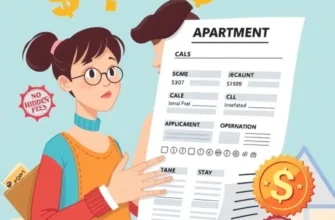Renting your first apartment should be a celebration, not a headache. However, it’s easy to get swept off your feet by a stylish bathroom or an iconic skyline view, only to find that hidden fees have drained your pockets quicker than you can say “security deposit.” From application fees to maintenance charges, navigating the rental landscape can be tricky. This guide is here to shed light on those pesky hidden costs that can transform your dream rental into a financial nightmare. With a little knowledge, you can keep your budget intact and possibly channel your inner Sherlock Holmes! Let’s embark on a quest to uncover these fees and ensure you’re not left scratching your head as bills roll in. After all, whether you’re a young professional, a couple, or a family looking for that perfect home, your wallet deserves a break.
The Hidden Costs You Didn’t Bargain For

Renting your first apartment comes with an exciting mix of freedom and responsibility. However, beyond the straightforward monthly rent, a host of hidden fees can surprise and strain your budget. Navigating these sneaky costs requires awareness and tactful questioning. Here’s what you need to watch out for.
Application Fees: Before even calling an apartment your home, landlords often charge an application fee. This fee covers background and credit checks. It’s typically non-refundable, so budgeting for this initial cost is crucial. Ask if the fee guarantees the apartment will be held for you during the application process.
Administration Fees: Some properties label these charges as administrative or processing fees, covering costs for drafting the lease or maintaining tenant records. It’s essential to ask about this upfront and understand what you’re paying for.
Security Deposits and Advance Rent: Security deposits are common, meant to protect landlords against damages. Familiarize yourself with what damages might be costly (read more). Moreover, some landlords insist on advance rent payments. Clarify these details early to avoid gaps in your budget planning.
Pet Fees: If you’re a pet owner, be prepared for one-time fees or monthly charges. It’s not just about cleaning costs; landlords often include wear and tear attributed to pets. Ask if refundable pet deposits are available and under what conditions.
Parking Fees: Urban areas especially might charge for parking. Fees can vary significantly, so inquire about costs for assigned spots or garages. Consider whether the charge covers the entirety of your stay or is subject to change.
Maintenance and Amenity Fees: These can tiptoe into your budget without warning. Some leases include fees for repairs or amenities like gyms and pools. Clarifying what’s included and what comes at an extra cost is pivotal.
Renter’s Insurance: While not always a hidden fee, it may be a requirement. It’s often the renter’s responsibility to obtain insurance against theft, accidents, or property damage. Understanding the claims process is just as important; learn more about it to protect your interests effectively.
Utility Costs: It’s easy to overlook utilities when reviewing rental costs. Understand whether your rent includes utilities like water, heat, or garbage collection. If not, request average costs from the current tenant or landlord.
Approach lease-signing with a proactive set of questions. Do a thorough read-through of your lease agreement to spot these fees before they catch you off guard. When armed with this knowledge, hidden costs become less daunting and your rental experience is much more enjoyable.
Negotiating Like a Pro: Ask the Right Questions

Signing a lease can feel like navigating a maze of terms and conditions. To protect yourself from unexpected costs, arm yourself with the right questions before committing. Understanding what is included in your rent can save you from surprises down the road. Ask whether utilities like water, gas, or internet are part of your monthly payment. If not, it’s crucial to understand how these bills are calculated and whether you have a choice of providers. For more on understanding utility charges, check here.
Another common pitfall is unclear maintenance responsibilities. While most landlords handle structural repairs, some pass on minor fixes to tenants. Clarify if you are responsible for issues like a leaky faucet or a blown fuse. Find out if there’s a specific protocol for reporting maintenance issues and what the expected timeline is for repairs. This will help you avoid unnecessary charges or prolonged discomfort.
Security deposits are another area ripe for hidden costs. It’s wise to confirm how much you’re required to pay upfront and under what conditions it might not be returned. Ensure you understand how to document the property’s condition at move-in and move-out. For handy tips on getting your deposit back, see this resource: here.
Ask about any additional fees associated with parking, storage, or amenities. These can add up quickly and alter your monthly budget. Request clarification on whether these are opt-in or mandatory fees. Sometimes, landlords may offer discounts on these extras, so don’t hesitate to negotiate for a better rate.
Next, clarify policy on rent increases. Is there a limit on how often or how much your rent can increase? Understanding this helps with planning your finances for the long term and avoiding abrupt disruptions in your monthly expenses.
Lastly, inquire about lease termination fees and conditions. Life can be unpredictable, and you might need to cancel your lease early. Know the penalties involved and whether you’re allowed to sublet if needed. This foresight can spare you hefty fines or the responsibility of paying for an unused apartment space.
By asking targeted questions and insisting on clear answers, you empower yourself to make informed decisions. This proactive approach can safeguard your finances and ensure a smoother renting experience. While each lease is unique, having these fundamental areas covered will serve as your guide to dodge unexpected rental fees and stress.
Final words
Navigating the world of rental properties shouldn’t feel like a scavenger hunt for lost treasures. Armed with knowledge about hidden fees, you can confidently walk through lease agreements and make informed decisions. Remember, it’s perfectly fine to ask questions and negotiate! This isn’t just a place to live; it’s your home, and it should fit in your budget without breaking the bank. Keep an eye out for those sneaky charges and always read the fine print. Happy renting—and may your first home be everything you imagined, with none of the surprise costs!









